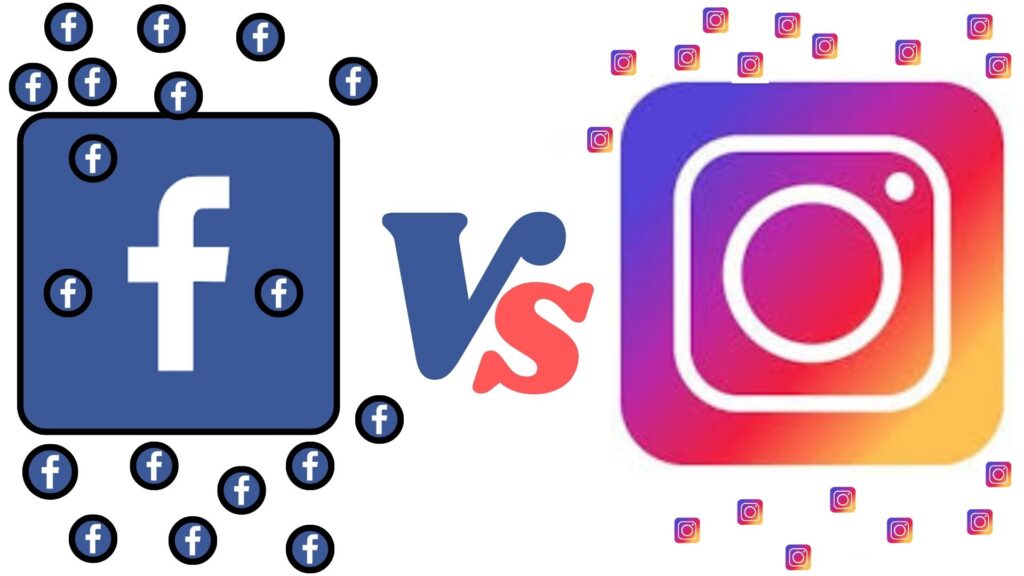In today’s digital age, social media platforms have become indispensable tools for businesses seeking to expand their reach, engage with customers, and increase brand visibility. Among the plethora of options available, Facebook and Instagram stand out as two of the most popular and powerful platforms for businesses of all sizes. However, each platform offers distinct features and advantages, making it essential for businesses to understand their differences to determine which one best suits their needs. In this comprehensive guide, we’ll delve into the key differences Facebook Vs Instagram to help you make an informed decision for your business.
Understanding the Basics Facebooks & Instagram
Founded in 2004, Facebook is the world’s largest social networking platform, boasting over 2.8 billion monthly active users as of 2022. It allows users to create profiles, connect with friends and family, join groups, and share content such as photos, videos, and status updates. For businesses, Facebook offers a range of features including Pages, Groups, and Ads Manager, making it a versatile platform for marketing and advertising purposes.
Launched in 2010 and acquired by Facebook in 2012, Instagram has rapidly grown into one of the most popular visual-centric social media platforms, with over 1 billion monthly active users. Instagram focuses on photo and video sharing, with features such as Stories, IGTV, and Reels catering to various content formats. It’s particularly popular among younger demographics and businesses looking to showcase visually appealing content.
Audience Demographics
When deciding Facebook Vs Instagram, understanding the demographics of each platform’s user base is crucial:
- While Facebook’s user base is vast and diverse, it tends to skew slightly older compared to Instagram.
- According to recent statistics, the majority of Facebook users fall within the 25 to 54 age range, making it ideal for targeting a broad audience.
- It’s worth noting that Facebook’s user base includes a significant number of baby boomers and Generation X users, making it suitable for businesses targeting these demographics.
- Instagram’s user base is characterized by its younger demographic, with a significant portion of users aged 18 to 34.
- The platform is particularly popular among millennials and Generation Z, who are drawn to its visually appealing content and immersive features.
- Businesses targeting a younger audience or those in visually-driven industries such as fashion, beauty, and travel may find Instagram to be an effective platform for reaching their target market.
Content Types and Formats
Both Facebook and Instagram offer a variety of content formats for businesses to engage their audience:
Facebook:
- Facebook supports a wide range of content types, including text posts, photos, videos, links, and live streams.
- Businesses can create dedicated Facebook Pages to showcase their products or services, interact with customers, and post updates.
- The platform’s algorithm prioritizes meaningful interactions, encouraging businesses to focus on creating engaging and shareable content to reach a larger audience.
Instagram:
- Instagram is renowned for its visual-centric approach, with a primary focus on photos and videos.
- Businesses can leverage features such as Stories, IGTV, and Reels to share ephemeral or long-form content and engage with their audience in creative ways.
- Instagram’s emphasis on aesthetics and visual storytelling makes it an ideal platform for showcasing products, behind-the-scenes content, and user-generated content.
Engagement and Reach:
When it comes to engagement and reach, both Facebook and Instagram offer unique advantages:
Facebook:
- While organic reach on Facebook has declined in recent years due to algorithm changes, the platform still boasts robust targeting options and ad formats through Facebook Ads Manager.
- Businesses can leverage Facebook Groups to foster community engagement, facilitate discussions, and build relationships with their audience.
- The platform’s Messenger feature allows businesses to provide real-time customer support and personalized communication, enhancing the overall customer experience.
Instagram:
- Instagram’s visual nature and highly engaged user base make it an excellent platform for driving likes, comments, and shares.
- The platform’s Explore page enables users to discover new content and accounts based on their interests, increasing the potential reach for businesses.
- Instagram’s advertising options, including sponsored posts and Stories ads, provide businesses with targeted reach and the ability to drive conversions directly from the platform.
Analytics and Insights
Both Facebook and Instagram offer robust analytics tools to help businesses track their performance and optimize their strategies:
- Facebook Insights provides businesses with valuable data on metrics such as reach, engagement, and demographics, allowing them to understand their audience and refine their content strategy accordingly.
- Businesses can access detailed analytics for their Facebook Pages, posts, and ads, enabling them to measure the effectiveness of their marketing campaigns and make data-driven decisions.
- Instagram Insights offers similar features to Facebook Insights, providing businesses with valuable insights into their audience demographics, post performance, and follower growth.
- Businesses can track metrics such as impressions, profile visits, and website clicks, gaining actionable insights to improve their content and engagement strategies on the platform.
See Also – TikTok Vs Instagram
Conclusion
In conclusion, both Facebook and Instagram offer unique advantages for businesses seeking to establish a strong presence on social media. While Facebook provides a broad reach and diverse targeting options, Instagram excels in visual storytelling and engaging a younger demographic. Ultimately, the choice between Facebook and Instagram depends on factors such as your target audience, content strategy, and business goals.
To maximize your social media presence, consider leveraging both platforms strategically, tailoring your content and messaging to suit the preferences of each audience. By understanding the Facebook Vs Instagram and harnessing their respective strengths, you can effectively connect with your target audience, drive engagement, and achieve your business objectives in the competitive digital landscape.

